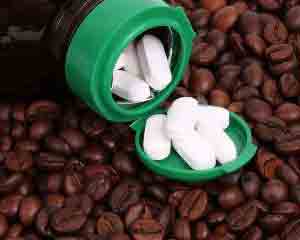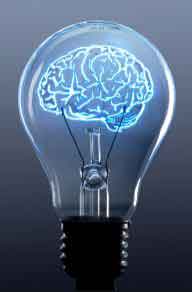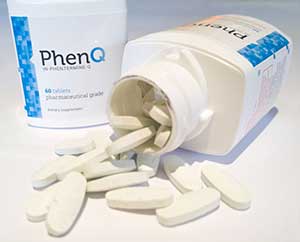Caffeine
 If you have looked into fat-burners and diet pills then you’ll realize Caffeine is quite pervasive across the industry, in that it is in included in virtually every fat loss supplement out there.
If you have looked into fat-burners and diet pills then you’ll realize Caffeine is quite pervasive across the industry, in that it is in included in virtually every fat loss supplement out there.
While a lot of nay-sayers will criticize caffeine’s inclusion in so many products, it’s difficult to agree with them when you consider the sheer weight of supporting evidence that caffeine does exactly what it is often touted about it.
When I read forums (which I do a lot) and someone writes something along the lines of – “Ugh, but it’s just another scam product with a bunch of caffeine in it.” – I feel a bit defensive. Along with creatine monohydrate, caffeine is one of the most proven supplements on the planet.
I guess things that stick around for a long time get boring, no matter how good they are. Maybe that’s why companies often call caffeine by its chemical name: 1,3,7-Trimethylxanthine.
Not only is caffeine a proven and effective stimulant, it’s also a fat-burner, performance enhancer and nootropic. Now, before we get into the finer points of nootropics, let’s talk about fat-burning.
Caffeine and Fat-Burning
Caffeine is a powerful fat-burner because it has a few different modes of action to achieve it:
Thermogenesis
By raising the body’s core temperature, the base metabolic rate is also increased and therefore so is energy expenditure. This is most likely where the term fat-burning originated, because heat is quite literally the mode of action.
Lipolysis
Caffeine can force triglycerides to release fatty acids, which can be burned as fuel for activity of any kind.
cAMP
Certain enzymes, which are inhibited by caffeine, would otherwise reduce the levels of circulating cyclic adenosine monophosphate (cAMP). By inhibiting these enzymes, cAMP levels increase, which reduces the amount of triglycerides in fat cells.
Note: By inhibiting enzymes that themselves inhibit cAMP levels, caffeine opens the door for other supplements that increase cAMP to do their job more effectively. In this way, caffeine is very synergistic with other ingredients such as Synephrine.
Increasing the levels of cAMP has another effect on the body: A higher rate of protein synthesis, which brings us to one of the more surprising aspects of caffeine’s behaviour – performance enhancement.
Caffeine and Performance Enhancement
This section may get the attention of all types of athletes – from the intensely powerful to the super endurance – and maybe not from the dieting/slimming group, but to be honest, it should be of interest to both.
In truth, even the semi-serious athlete knows that caffeine can help, but maybe not to the extent that it does.
Protein Synthesis
I’ve just mentioned that cyclic adenosine monophosphate plays a role in increasing protein synthesis. This will result in faster recovery and muscle growth between exercise and will help retain muscle mass if you are losing fat weight. Hopefully that covered the athletes and the slimmers in one.
Please remember that muscle retention is in itself a fight against fat. Muscle burns calories just to stay as it is.
Anaerobic Cardio-Vascular Exercise
Caffeine has been shown to reduce muscle fatigue during high intensity training. Scientists studying it believe it achieves this through both neurological and musculoskeletal pathways.
Aerobic Exercise
Supplementation of caffeine can significantly increase aerobic endurance. Essentially, the time to exhaustion at a given level of output is extended.
DOMS
Delayed Onset Muscle Soreness…one of the biggest deterrents to returning to the gym after a workout. This post-exercise soreness and fatigue is often what brings New Year gym resolutions to a grinding halt.
Caffeine and Cognitive Function
 Said the word nootropic earlier and promised to come back to it. Nootropics are supplements which are taken for their positive effects on the brain. Caffeine is certainly one of them. It provides mental stimulation by increasing the sensitivity of neurons.
Said the word nootropic earlier and promised to come back to it. Nootropics are supplements which are taken for their positive effects on the brain. Caffeine is certainly one of them. It provides mental stimulation by increasing the sensitivity of neurons.
On ingestion, caffeine stimulates the release of adrenaline and dopamine, serotonin and acetylcholine which together can induce euphoric feelings, improved mood and makes us excited.
It helps us focus and fight tiredness when it’s critical for us to get something done.
Caffeine and Everything Else
Caffeine has even been shown to decrease the risk of contracting certain cancers, Alzeimer’s and cirrhosis. It is also used as a treatment for the motor-control side effects of Parkinson’s disease.
Using Caffeine
 Does all of this mean you should go and guzzle gallons of coffee? Answer – No, of course not. Too much of the stuff will give you the jitters and possibly even heart palpitations.
Does all of this mean you should go and guzzle gallons of coffee? Answer – No, of course not. Too much of the stuff will give you the jitters and possibly even heart palpitations.
Caffeine is notably helpful at doses between 200mg and 400mg a day. It’s more difficult to judge how much you are going to get from different types of coffee because it can range from low to high concentration depending on the strength of the blend and how it’s brewed etc.
Personally I find 2 or 3 cups of coffee a day – which is roughly what you would need to fulfill the dose above – is too much,; I have the excitability but then I crash and burn. The equivalent caffeine in supplement form however works just fine and provides a much longer and steadier buzz.
Cycling Caffeine
Tolerance buildup to caffeine is insurmountable which means once you have built the tolerance, taking higher doses will not help. This matters for people taking caffeine to lose fat.
What you can do is cycle off caffeine every few months. Take anywhere from a week to a month off it and then you can start again and feel the full effects.
After several months of habitual caffeine use, the only benefit that really stays is its ability to ward off sleep.
Conclusion
 Caffeine is a very good supplement for both fat-burning and performance enhancing – along with a plethora of other benefits.
Caffeine is a very good supplement for both fat-burning and performance enhancing – along with a plethora of other benefits.
If a product contains caffeine and some of its more synergistic partners like synephrine and L-theanine for example, it’s well worth a look.
I’m not saying caffeine should be the only ingredient in a fat-burner or training supplement, but it’s a damn good base to build on.
It’s been around and proven so long, there’s no hype about it anymore – that’s exactly why caffeine deserves to be hyped up every so often.
Click here to read about one of the best caffeine containing supplements on the market

Be the first to comment